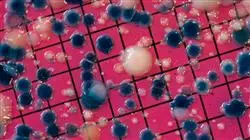University certificate
The world's largest faculty of medicine”
Introduction to the Program
Improve your diagnostic skills in mycotic and bacteriological diseases with this Postgraduate diploma with excellent curricular value"

Imported diseases have become a global threat. With the increase in population movements and climate change, the effects that were once limited to certain geographical areas now reach every corner of the planet. Within this group, fungal and neglected diseases currently require very special attention.
On the other hand, people no longer suffer from the diseases typical of their area. The population travels and with it the bacteria, which move from one continent to another at great speed. The approach to the diseases created by these external bacterial groups requires an updated and trained professional who can respond to their diagnosis and treatment needs.
Therefore, during this Postgraduate diploma students will have the opportunity to acquire the basic knowledge required to face the situations that arise around patients suspected of having contracted a disease while traveling. From the moment of diagnosis, with the development of the guidelines that the specialist must follow, to the information on procedures or attitudes to eradicate in this medical practice, throughout the course, students will learn to integrate new techniques and the most advanced procedures in this discipline into their work.
The differential contribution of this Postgraduate diploma is its eminent practical vision. This approach has been implemented in all the teaching materials that the student will use during their training. Our goal: to enable you to start applying what you have learned immediately in your work.
Imported diseases have become a real public health problem. For this reason, healthcare institutions are increasingly demanding professionals specialized in this area"
The Postgraduate diploma in Diagnostics, Bacteriology and Mycology in Imported Diseases contains the scientific most complete and up-to-date educational program on the market. The most important features of the program include:
- Practical cases presented by experts in Imported infectious diseases
- The graphic, schematic, and eminently practical contents with which they are created provide scientific and practical information on the disciplines that are essential for professional practice
- Practical exercises where the self-assessment process can be carried out to improve learning
- Special emphasis on innovative methodologies
- Theoretical lessons, questions to the expert, debate forums on controversial topics, and individual reflection assignments
- Content that is accessible from any fixed or portable device with an Internet connection
Grow as a physician with expertise in imported infectious diseases and become a key player in your industry"
The program’s teaching staff includes professionals from the sector who contribute their work experience to this training program, as well as renowned specialists from leading societies and prestigious universities.
The multimedia content, developed with the latest educational technology, will provide the professional with situated and contextual learning, i.e., a simulated environment that will provide immersive training programmed to train in real situations.
This program is designed around Problem Based Learning, whereby the professional must try to solve the different professional practice situations that arise during the academic year. For this purpose, the professional will be assisted by an innovative interactive video system created by renowned and experienced experts.
In a virtually borderless and globalized world, the transmission of infectious diseases must be properly controlled to ensure people's health"

During this online program, you will learn about the most relevant characteristics of imported infectious diseases of mycotic or bacteriological nature"
Why study at TECH?
TECH is the world’s largest online university. With an impressive catalog of more than 14,000 university programs available in 11 languages, it is positioned as a leader in employability, with a 99% job placement rate. In addition, it relies on an enormous faculty of more than 6,000 professors of the highest international renown.

Study at the world's largest online university and guarantee your professional success. The future starts at TECH”
The world’s best online university according to FORBES
The prestigious Forbes magazine, specialized in business and finance, has highlighted TECH as “the world's best online university” This is what they have recently stated in an article in their digital edition in which they echo the success story of this institution, “thanks to the academic offer it provides, the selection of its teaching staff, and an innovative learning method aimed at educating the professionals of the future”
A revolutionary study method, a cutting-edge faculty and a practical focus: the key to TECH's success.
The most complete study plans on the university scene
TECH offers the most complete study plans on the university scene, with syllabuses that cover fundamental concepts and, at the same time, the main scientific advances in their specific scientific areas. In addition, these programs are continuously being updated to guarantee students the academic vanguard and the most in-demand professional skills. In this way, the university's qualifications provide its graduates with a significant advantage to propel their careers to success.
TECH offers the most comprehensive and intensive study plans on the current university scene.
A world-class teaching staff
TECH's teaching staff is made up of more than 6,000 professors with the highest international recognition. Professors, researchers and top executives of multinational companies, including Isaiah Covington, performance coach of the Boston Celtics; Magda Romanska, principal investigator at Harvard MetaLAB; Ignacio Wistumba, chairman of the department of translational molecular pathology at MD Anderson Cancer Center; and D.W. Pine, creative director of TIME magazine, among others.
Internationally renowned experts, specialized in different branches of Health, Technology, Communication and Business, form part of the TECH faculty.
A unique learning method
TECH is the first university to use Relearning in all its programs. It is the best online learning methodology, accredited with international teaching quality certifications, provided by prestigious educational agencies. In addition, this disruptive educational model is complemented with the “Case Method”, thereby setting up a unique online teaching strategy. Innovative teaching resources are also implemented, including detailed videos, infographics and interactive summaries.
TECH combines Relearning and the Case Method in all its university programs to guarantee excellent theoretical and practical learning, studying whenever and wherever you want.
The world's largest online university
TECH is the world’s largest online university. We are the largest educational institution, with the best and widest online educational catalog, one hundred percent online and covering the vast majority of areas of knowledge. We offer a large selection of our own degrees and accredited online undergraduate and postgraduate degrees. In total, more than 14,000 university degrees, in eleven different languages, make us the largest educational largest in the world.
TECH has the world's most extensive catalog of academic and official programs, available in more than 11 languages.
Google Premier Partner
The American technology giant has awarded TECH the Google Google Premier Partner badge. This award, which is only available to 3% of the world's companies, highlights the efficient, flexible and tailored experience that this university provides to students. The recognition as a Google Premier Partner not only accredits the maximum rigor, performance and investment in TECH's digital infrastructures, but also places this university as one of the world's leading technology companies.
Google has positioned TECH in the top 3% of the world's most important technology companies by awarding it its Google Premier Partner badge.
The official online university of the NBA
TECH is the official online university of the NBA. Thanks to our agreement with the biggest league in basketball, we offer our students exclusive university programs, as well as a wide variety of educational resources focused on the business of the league and other areas of the sports industry. Each program is made up of a uniquely designed syllabus and features exceptional guest hosts: professionals with a distinguished sports background who will offer their expertise on the most relevant topics.
TECH has been selected by the NBA, the world's top basketball league, as its official online university.
The top-rated university by its students
Students have positioned TECH as the world's top-rated university on the main review websites, with a highest rating of 4.9 out of 5, obtained from more than 1,000 reviews. These results consolidate TECH as the benchmark university institution at an international level, reflecting the excellence and positive impact of its educational model.” reflecting the excellence and positive impact of its educational model.”
TECH is the world’s top-rated university by its students.
Leaders in employability
TECH has managed to become the leading university in employability. 99% of its students obtain jobs in the academic field they have studied, within one year of completing any of the university's programs. A similar number achieve immediate career enhancement. All this thanks to a study methodology that bases its effectiveness on the acquisition of practical skills, which are absolutely necessary for professional development.
99% of TECH graduates find a job within a year of completing their studies.
Postgraduate Diploma in Diagnostics, Bacteriology and Mycology in Imported Diseases
Diagnostics, bacteriology and mycology are important areas of medicine used in the identification and treatment of diseases, including imported diseases.
Diagnosis is the process of identifying a disease or disorder in a patient. Diagnosis is important in imported diseases, as these are often not common in the area where the person was infected. Specialized skills in tropical and infectious medicine are needed to correctly diagnose these diseases. Many imported diseases can present with symptoms similar to those of other common diseases and can be confused with other conditions.
Bacteriology focuses on the study of bacteria and their characteristics. In imported diseases, bacteriology can be useful in identifying bacteria that cause diseases common in other countries. Some common bacterial diseases in imported diseases include typhoid fever, bacterial meningitis and tuberculosis.
Mycology is the study of fungi and their characteristics. In imported diseases, mycology focuses on the identification of fungi that can cause infections in humans. Some common fungal diseases in imported diseases include candidiasis, aspergillosis and cryptococcosis.
Together, diagnostics, bacteriology and mycology are valuable tools in the identification, diagnosis and treatment of imported diseases. It is important that medical professionals have specialized knowledge in these areas and are trained to detect, treat and prevent imported diseases.
TECH, the world's largest digital university, has an academic program designed to provide students with the skills and knowledge necessary to diagnose and treat imported infectious diseases using advanced microbiological techniques for the identification of specific pathogens. Students learn to use microbiological diagnostic techniques to detect pathogens in different types of samples, such as blood, tissues, body fluids, as well as to identify and distinguish the bacterial and mycological characteristics of these agents. They also learn to understand the microbiology of imported diseases and various therapeutic strategies to treat these diseases.







